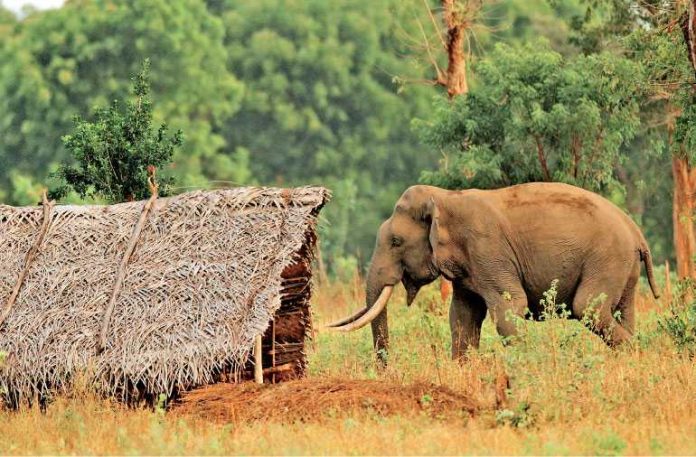In a concerted effort to address the longstanding issue of human-elephant conflict, the government has unveiled two pioneering pilot projects: the ‘Temporary Agricultural Electric Fence’ and the ‘Village Electric Fence.’ These initiatives, announced following a high-level discussion led by Senior Advisor to the President on National Security and Chief of Presidential Staff, Sagala Ratnayaka, signify a proactive step towards safeguarding both rural communities and vital farmlands from the destructive impact of wild elephant encroachments.
The pressing need for such interventions has become increasingly apparent as human-elephant conflict continues to escalate, particularly in conflict-prone districts. With villages and farmlands bearing the brunt of these encounters, the implementation of innovative solutions has become imperative to mitigate the associated risks and losses.
Central to these initiatives is the deployment of temporary agricultural electric fences, aptly named Agro Fences, designed to shield farmlands during critical periods such as the harvest season. By strategically placing these fences in conflict hotspots, farmers can safeguard their crops while simultaneously minimizing potential confrontations with wild elephants. Moreover, the decision to dismantle these fences post-harvest underscores a sustainable approach, ensuring minimal disruption to wildlife movement while addressing the immediate needs of farmers.
Equally significant is the proposed construction of electric fences around villages frequently besieged by human-wild elephant conflicts. Termed Village Fences, these protective barriers aim to fortify communities against elephant intrusions, thereby enhancing safety and reducing the risk of property damage and human casualties. By securing residential areas, the government endeavors to provide residents with a sense of security while fostering coexistence between humans and wildlife.
Crucially, these initiatives reflect a holistic approach to wildlife conservation and conflict resolution, encompassing both short-term interventions and long-term strategies. Beyond the physical barriers, discussions have also encompassed the preservation of trained elephants for cultural events and parades, as well as the regulation of private elephant ownership. Such measures underscore the government’s commitment to addressing the multifaceted challenges posed by human-elephant conflict, recognizing the need for comprehensive and sustainable solutions.
Moving forward, the successful implementation of these pilot projects hinges on effective collaboration between government agencies, local communities, and wildlife experts. The directives issued by Sagala Ratnayaka, urging the compilation of a comprehensive report to facilitate President Ranil Wickremesinghe’s review, signify a concerted effort to expedite the deployment of these initiatives. With the Secretary of the Ministry of Wildlife and Forest Conservation and other stakeholders actively engaged in the process, there is optimism that these interventions will yield tangible results in mitigating human-elephant conflict and fostering harmonious coexistence between humans and wildlife.
As the government takes decisive steps to confront this complex challenge, it underscores the importance of proactive measures, community involvement, and interdisciplinary collaboration in safeguarding both human livelihoods and the natural heritage of Sri Lanka. By embracing innovation and cooperation, the nation can aspire to a future where human-elephant conflict is minimized, and wildlife conservation is prioritized, ensuring a sustainable and harmonious coexistence for generations to come.


